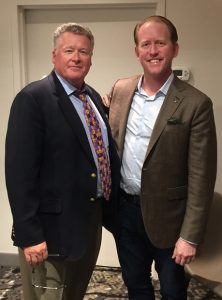By Leischen Stelter, editor of In Public Safety
During the 6th annual Mid-Atlantic INLETS seminar on June 20-24 in Annapolis, Maryland, attendees had the privilege of hearing from one of the nation’s most celebrated military heroes.
Robert O’Neill, now retired from the U.S. Navy, was the team leader for SEAL Team 6 who is widely known to have fired the shots that killed Osama bin Laden in 2011. O’Neill gave a compelling and entertaining keynote address during the first day of INLETS.

Only a brief portion of his presentation discussed his involvement in the Osama bin Laden raid. His role is well-known, thanks to a popular documentary series. One thing he noted about the raid was the difference between over-planning and being prepared. “We spent a week and a half planning the Osama bin Laden raid,” he said. “The night before, we were standing around a table and I asked ‘What’s the worst-case scenario?’ to which one of my guys said, ‘Well, the helicopter could crash in the front yard.’” The audience erupted in laughter and O’Neill acknowledged that no mission will ever go exactly as planned. Individuals must be trained how to remove emotion from a stressful situation so they can make an informed decision.
O’Neill shared how he learned to be mentally tough so he could endure the nation’s most difficult military training. He discussed, in detail, the intensity of becoming a U.S. Navy SEAL. “They design the courses to make it easy to quit,” he said. “They want you to quit. No matter what, 80 percent of people don’t make it.”
While his personal mantra of “never quit” got him through some of the most difficult physical and mental trials, he admitted, “there’s a big difference between saying never quit and actually doing it.” Throughout his training, he kept reminding himself that he would never be asked to something that was impossible. Everything could be done and he was determined to do it.
Minimizing Self-Induced Stress
One of the best strategies he learned through his SEAL training was how to minimize self-induced stress. “Stress is like a bag of bricks you carry around,” he said. “You have to put it down and forget about it and know that that stress is in your mind. Ultimately, you only feel the amount of stress that you allow yourself to feel.”
[Related: Coping with the Stress of Police Work]
SEAL training focuses heavily on simulating intense stress to see how trainees perform. In one scenario, trainees enter a building to locate an armed suspect. Trainers are located in the rafters above yelling about all the mistakes the SEALS are making – whether they’re true or not. Such training is meant to distract trainees so they continue to make mistakes during the drill.
“When you make a mistake, you have to learn to acknowledge it in the moment and just keep going. Some people are not able to forget about it and then they make more mistakes,” said O’Neill. “The trainers want to see how you handle the additional stress of making a mistake. Can you keep going?”
Throughout his presentation, O’Neill mentioned his admiration for law enforcement and the grit it takes for police officers to go out on the streets every day to face unknown dangers. He also noted that when officers face danger it is natural to feel afraid. “In combat, bravery is the ability to recognize fear and push it aside and do it anyway. Fear is healthy. It’s good. It helps you think more clearly,” he said. Officers need to always maintain a mental toughness so they can adjust their response according to the situation and not panic. “Panic is contagious and it can get everyone killed,” he said. And, when officers face a challenging and dangerous situation, which they likely will, “no matter what, don’t ever quit,” he said.
Read about other presentations from INLETS:

Comments are closed.